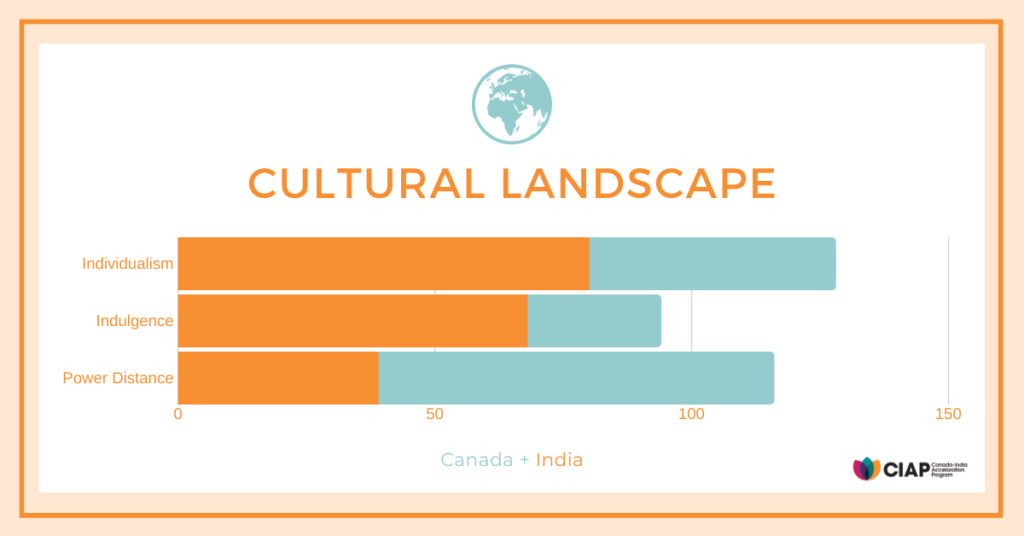Being Culturally Aware is Imperative
Once your business is at the stage it needs to be in order to properly and sustainably move into a new market, there are several reasons why understanding the cultural landscape is crucial to your success. Not all products and services sell the same everywhere in the world, therefore, conducting sufficient market-fit research before finalizing any plans is imperative for all types of business expansions – large or small. Cultural differences are one of the main causes of a product or services’ failure or success in a new market. If it doesn’t add value or meet the needs and desires of local markets, you can be sure it will not survive.
According to Hofstede, culture is defined “as the collective mental programming of the human mind which distinguishes one group of people from another.” Keep this in mind when entering any new markets as it is applicable across the board.
Establishing your business in India has tremendous opportunities available. But, comes with a range of underlying cultural values, beliefs, and assumptions that need to be considered when conducting any form of business there.
The points listed below are a guideline to help you adapt to the exciting Indian market and continue to expand your business successfully. It requires lots of patience and time to fully comprehend how business is done, but the growth potential is worth the effort you’ll put forth.
Hofstede Country Comparison

Below, we are going to outline where Canada and India align in terms of societal norms and tendencies. This is an effective tool to use when first entering India with your business, this ensures you don’t have any surprises and prepares you for the unexpected.
Power Distance
According to Hofstede Insights, “this dimension deals with the fact that all individuals in societies are not equal – it expresses the attitude of the culture towards these inequalities amongst us.
Power Distance is defined as the extent to which the less powerful members of institutions and organisations within a country expect and accept that power is distributed unequally.
It has to do with the fact that a society’s inequality is endorsed by the followers as much as by the leaders.
Canada: Canada has a score of 39, meaning there is a strong sense of interdependence among society. Many companies and organizations rely on individuals and teams for their expertise on certain topics and appreciate when information is shared freely through all communication efforts. The exchange of information is preferably done in a direct and straightforward manner. In terms of status and class, there is a lack of distinction between those who hold hierarchy in society and those who do not.
India: India’s score is 77, which indicates there is a strong sense of hierarchy within their class system. The higher-class members of society are more power-privileged because they are given more rights, treated differently, and they expect those underneath them to be obedient and dependent on them. Relationships between employees and managers are formal even if they are on a first-name basis. If there is any negative feedback, it is usually never offered up the ladder to people in senior roles.
Individualism
According to Hofstede Insights, “the fundamental issue addressed by this dimension is the degree of interdependence a society maintains among its members.
It has to do with whether people´s self-image is defined in terms of “I” or “We”. In Individualist societies, people are supposed to look after themselves and their direct family only. In Collectivist societies, people belong to ‘in groups’ that take care of them in exchange for loyalty.”
Canada: Canada scores 80, which means the society is self-reliant and displays initiative individually. People are expected to look after themselves and their immediate families. During the hiring process, an individual will be given a job or promotion if he/she shows evidence of ones work which validates them as a good candidate.
India: India scores 48, which means there is more emphasis put on being a part of a social framework. Each individual is expected to act in conformity with the opinions of family, neighbours, workgroups and any other groups you may be affiliated with. The society is considered to be a hybrid between individualists and collectivistic characteristics.

Masculinity
According to Hofstede Insights, “a high score (Masculine) on this dimension indicates that the society will be driven by competition, achievement and success, with success being defined by the winner / best in field – a value system that starts in school and continues throughout organisational life. A low score (Feminine) on the dimension means that the dominant values in society are caring for others and quality of life. A Feminine society is one where quality of life is the sign of success and standing out from the crowd is not admirable.
The fundamental issue here is what motivates people, wanting to be the best (Masculine) or liking what you do (Feminine).”
Canada: Canada scores 52, this indicates Canadians maintain high standards in both their professional and personal lives. Compared to the US, the concept of success and winning is less prevalent as there is more of a focus on work-life balance and people taking more time for themselves. Canadians are hard workers but are characterized as being moderately “masculine”.
India: India scores 56, which means they are quite Masculine in terms of actively exhibiting power and success, which is widely practiced across the country. Even though there are strong power dynamics between individuals, there are still many different religious philosophies that teach humility and abstinence. Work is the centre of their lives and showcasing their successes in the workplace is important.
Uncertainty Avoidance

According to Hofstede Insights, “the dimension Uncertainty Avoidance has to do with the way that a society deals with the fact that the future can never be known: should we try to control the future or just let it happen? This ambiguity brings with it anxiety and different cultures have learnt to deal with this anxiety in different ways.
The extent to which the members of a culture feel threatened by ambiguous or unknown situations and have created beliefs and institutions that try to avoid these is reflected in the score on Uncertainty Avoidance.
Canada: Canada scores 48, which means there is more acceptance for new innovative ideas and products whether it is new technologies or new ways to conduct business. There is an open-mindedness to the culture, but less emotionally expressive and Canadian society isn’t rule-oriented.
India: India scores 40, which means there is a high acceptance of imperfection and leniency in their daily lives. Many people don’t feel driven and feel comfortable settling into different roles and routines without any hassle. There is a common saying that says, “nothing is impossible” as long you can “adjust”. This mentality has many drawbacks but can also be empowering to others who thrive with this mindset.
Long Term Orientation
According to Hofstede Insights, “this dimension describes how every society has to maintain some links with its own past while dealing with the challenges of the present and future, and societies prioritise these two existential goals differently. Normative societies. which score low on this dimension, for example, prefer to maintain time-honoured traditions and norms while viewing societal change with suspicion. Those with a culture which scores high, on the other hand, take a more pragmatic approach: they encourage thrift and efforts in modern education as a way to prepare for the future.”
Canada: Canada scores 36, meaning there is more of a focus on short-term gratification in the present and in the past, rather than preparing for the future. There is a strong connection to traditions and instant gratification.
India: India scores 51, as there is a concept of “karma” that is at the core of their religious philosophies. Religion is considered more like a philosophy that encompasses many different views, practices, and ideas. There is an openness to how one acts within society with leniency when it comes to punctuality or constant change of plans. Being able to adapt and find comfort in oneself is more important than following an exact plan.
Indulgence
According to Hofstede Insights, “one challenge that confronts humanity, now and in the past, is the degree to which small children are socialized. Without socialization we do not become “human”. This dimension is defined as the extent to which people try to control their desires and impulses, based on the way they were raised. Relatively weak control is called “Indulgence” and relatively strong control is called “Restraint”. Cultures can, therefore, be described as Indulgent or Restrained.”
Canada: Canada scores 68, indicating that Canadians like to base their decisions off impulse and fun. They want to enjoy life and tend to be very optimistic the majority of the time. They appreciate having time for leisure and like to spend money as they please.
India: India scores 26, meaning the culture controls their desires and don’t have a strong appreciation for leisure time. There is a stigma associated with indulging that makes them feel like it is a wrong thing to do, as their social norms don’t encourage this type of behaviour.
In many ways, India and Canada have several overlapping societal norms but there are some key differences especially in Long Term Orientation, Power Distance and Indulgence. Take the time to get familiar with the types of differences you’ll face. It will equip you to thrive in the market and be successful during business interactions.
5 Essential Tips to Adapt

1. Learn how to be flexible
We’re accustomed to constantly being direct and structured in all business interactions in the Western society, but in India their communication is more indirect. When delivering bad news or a strong opinion, Indians prefer you say it with prudence and class. It takes time to uncover real issues and they have a very difficult time saying ‘no’. Utilizing your emotional intelligence can help you identify whether they are being polite by saying ‘no’ or ‘yes’. You’ll cope best if you take the time to build a relationship with your counterpart in order to understand their tendencies when conducting business. Being too direct during the business process is deemed as emotional, arrogant, and uncultured.
2. Be Formal
Status and formality are what the Indian culture take very seriously. Acknowledging people by their title and last name is a good practice during the initial stages of business talks. Another good practice is to shift your focus to the most senior individuals in the room and avoid communicating extensively to the junior staff. As you build a strong relationship with the Indian partner, you may begin using casual forms of address, but stray away from that during the beginning of the relations process.
3. Being Interrupted is not Uncommon
Indians enjoy performing multiple tasks simultaneously compared to western society’s fixation on focus and single-mindedness when working on projects. It is not uncommon for your presentations to be put on hold when they have a visitor, their smartphone rings and other distractions. It is important to be patient during these interruptions as your Indian counterpart is able to “go with the flow”, whereas you may feel like these things can be controlled and avoided. Instead of being frustrated, take time to learn how to be kind and adaptable to show you are easy to work with. If you try to change the standards set forth by the Indian culture, it will most likely lead to a disaster and business ties may be cut.
4. Re-think Your Work Schedule
In India, business and personal life are intertwined in one another quite tightly. It is not uncommon to take your work home with you for the weekend or having business start early and end really late. Don’t expect to just be working 9-5 shifts like you do in North America. You need to be extremely flexible and when determining where and when to do business.
5. Be Prepared for Culture Shock
If you have never travelled to this part of the world before, it is in your best interest to come into India with an open mind, open heart and a positive outlook. This is your chance to learn the culture and build strong relationships both professionally and personally. It is a completely different way of life with new sights and sounds for you to explore.
Key Takeaways

- New markets bring in new challenges
- India has a strong respect for hierarchy
- Be prepared to restructure your work schedule
- Take time to learn the culture and don’t make assumptions
- Don’t attempt to change how work is done, it won’t be well-received
- Be formal in all interactions, even if you are on a first name basis
- Being flexible and willing to adapt as you go will benefit all your business relations
- There are plenty of opportunities in India in many different sectors
What types of experiences did you face when moving into new markets? What did you have to learn in order to adapt? We would love to hear your stories! Share them with us below.
If you want to learn more about The Evolution of the Indian Startup Ecosystem, this article dives into the current business landscape in India as an emerging market.

Hindi Lyrics
12 November 2020 at 3:24 pmI have been looking for this Culture of India article since long time. Thanks author.
Landscaping Christchurch
2 February 2021 at 11:25 pmThank you for this suitable article about Canada India cultural landscape for business, it will help me and people like me looking for the same. I appreciate your effort for taking time to do your research and present these details before us. Really nice way to present this content, very appreciative!!Do visit this Yardscape.co.nz For vital information that can be used again by anyone.
3 February 2021 at 9:09 amWe appreciate your feedback! Our goal is to help the entrepreneurial community. If you’d like to see more content from us, follow our socials @ciaccelerate!